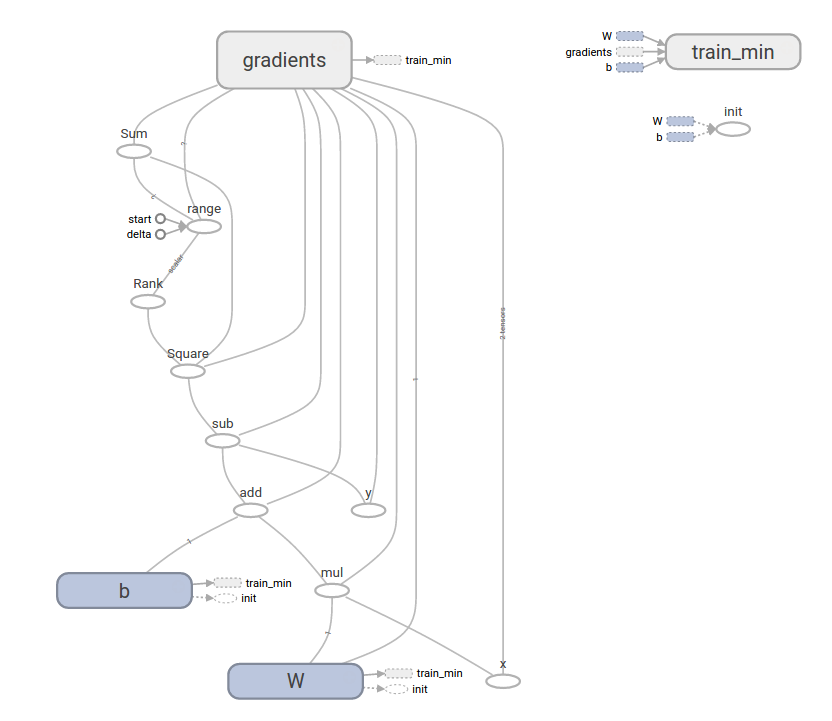tensorflow实现线性回归的完整程序
2017-05-05 16:51
253 查看
ubuntu version:16.04 LTS
tensorflow version:1.1.0
python version:2.7.12
运行结果:
tensorboard流程图

tensorflow version:1.1.0
python version:2.7.12
import numpy as np
import tensorflow as tf
# Model parameters
W = tf.Variable([.3], tf.float32)
b = tf.Variable([-.3], tf.float32)
# Model input and output
x = tf.placeholder(tf.float32)
linear_model = W * x + b
y = tf.placeholder(tf.float32)
# loss
loss = tf.reduce_sum(tf.square(linear_model - y)) # sum of the squares
# optimizer
optimizer = tf.train.GradientDescentOptimizer(0.01)
train = optimizer.minimize(loss)
# training data
x_train = [1,2,3,4]
y_train = [0,-1,-2,-3]
# training loop
init = tf.global_variables_initializer()
sess = tf.Session()
sess.run(init) # reset values to wrong
for i in range(1000):
sess.run(train, {x:x_train, y:y_train})
# evaluate training accuracy
curr_W, curr_b, curr_loss = sess.run([W, b, loss], {x:x_train, y:y_train})
print("W: %s b: %s loss: %s"%(curr_W, curr_b, curr_loss))运行结果:
W: [-0.9999969] b: [ 0.99999082] loss: 5.69997e-11
tensorboard流程图

相关文章推荐
- 第一次真正意义上的用VC++实现的一个完整的Win32程序-俄罗斯方块
- Asp.net程序注册的完整实现
- C++实现的完整伸展树程序
- 微信小程序-商城完整实现
- Android程序自动更新功能模块的实现方法【附完整demo源码下载】
- 第一次真正意义上的用VC++实现的一个完整的Win32程序-俄罗斯方块
- 【8.17】建立一个用来实现求3个数和的类模板(将成员函数定义在类模板的内部),并写出调用此类模板的完整程序。
- 完整的AES分组与文件的加解密功能程序实现
- 线性回归、梯度下降以及运用TensorFlow进行简单实现
- 一个完整托盘程序的实现
- C#打印程序实现完整文档打印功能
- C++实现的完整伸展树程序
- Android应用的自动升级、更新模块的实现完整方案+参考程序
- javascript圆盘抽奖程序实现原理和完整代码例子
- Android应用的自动升级、更新模块的实现完整方案+参考程序代吗
- 快速排序(完整程序c语言实现)
- Android应用的自动升级、更新模块的实现完整方案+参考程序
- 判断手机号码是否合法(完整实现程序)
- tensorflow 实现线性回归
- 算法导论第6章实现堆排序的完整程序
